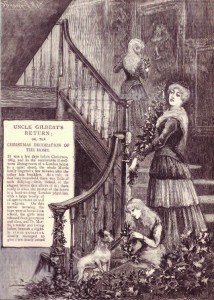How to search for your ancestors in the Welsh Parish Church Registers

Cefu Llys Church, Llandrindod Wells
If your ancestors came from Wales then one of the most important record sets that you are going to want to use is those of the Parish Churches. Don’t be confused that they are Church of England churches until the second decade of the 20th century, as the Anglican churches in Wales were a part of the Established Church until 1920. You may also think that because your ancestors worshiped in the Chapels of some of the other Christian denominations that Parish Church registers are not relevant for you. Most often this is certainly not the case!
Welsh Anglican Parish Records were created by the parish church for each area of the country. In their pages can be found recorded the details of millions of people at the time of their baptism, marriage or burial and they will often include ancestors who may have worshiped at a nonconformist chapel. While you may know that your past family were Methodists, Baptists, Presbyterians or Unitarians they may still have come to the Parish Church for a christening, wedding or a funeral service for reasons that we will look at later. These Parish Church records can reveal information about your family members that will enable you to find names, get back a generation or more and build your family tree.
An arm of the state
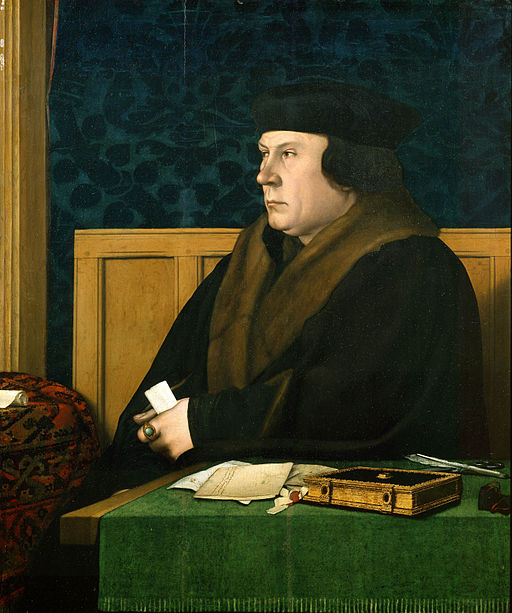
Thomas Cromwell chief minister to King Henry VIII from 1532 to 1540
Before 1837, and the introduction of civil registration of births, marriages and deaths, the records made by the local Anglican Parish Church are where you will find the vital events of your ancestors recorded. The keeping of these records began in Henry VIII’s time when his Lord Privy Seal and Vicegerent, Thomas Cromwell, instructed the clergy in England and Wales that they were to record the baptisms, marriages and burials that they performed in their churches. While records were started in 1538 some parishes didn’t begin recording these ceremonies until 1598 and very few of the early records survive.
At the time of the Reformation, and the break from Rome, the ancient Catholic parish churches In Wales became a part of the Church of England and the Established Church. Similar to the parish churches in England, they acted as an arm of the state in carrying out the process of recording details of their parishioners. It was only in 1920 that the Church in Wales was disestablished and today it is fully independent of both the state and the Church of England while still being, however, an independent member of the Anglican Communion.
How can they help my research?
The church registers that the Welsh parish churches kept for generations can be fascinating for the researcher to use. They can reveal to you the names of an ancestor’s parents in a baptism entry and so allow you to get back another generation when previously you were in the dark as to who the parents had been. Likewise, the marriage of an ancestor listed in the page of a parish register can introduce you to the name of the person that they married. This is especially exciting if this is the first time you have found their name!
Early registers were composite – that is they contained all three records in the same volume. Sometimes the records were separated into different sections and in other cases they were chronological and written on the same page. In 1754, however, this changed when a new law required that marriages had to be recorded in a separate book and banns of marriages – public proclamations of a couple’s intent to marry – were now to be recorded in yet another volume.

A composite parish register for Llanthewy Rytherch with baptisms, marriages and burials all on the same page
The next significant change happened in 1812 when pre-printed registers were introduced for baptisms, marriages, and burials, and separate registers were then kept by the church for all three. Pre-printed registers are useful for family historians as they define what information was required to appear in a record and so the vicar was guided to enter the details that often were missed in the earlier examples of parish registers.
In the later printed form registers there are extra details to be had such as whether the parties had been married before, if they were both from the parish or, if not, the name of the other person’s parish. Researchers are also able to note whether the bride and groom could write or whether they had signed the register with their mark, such as a simple cross. The names of witnesses, who were sometimes close relatives and so could be useful in researching the family, may also be found in these documents.

Marriages from 1813 in parish of Llanycil, Merionethshire found online at TheGenealogist [1]
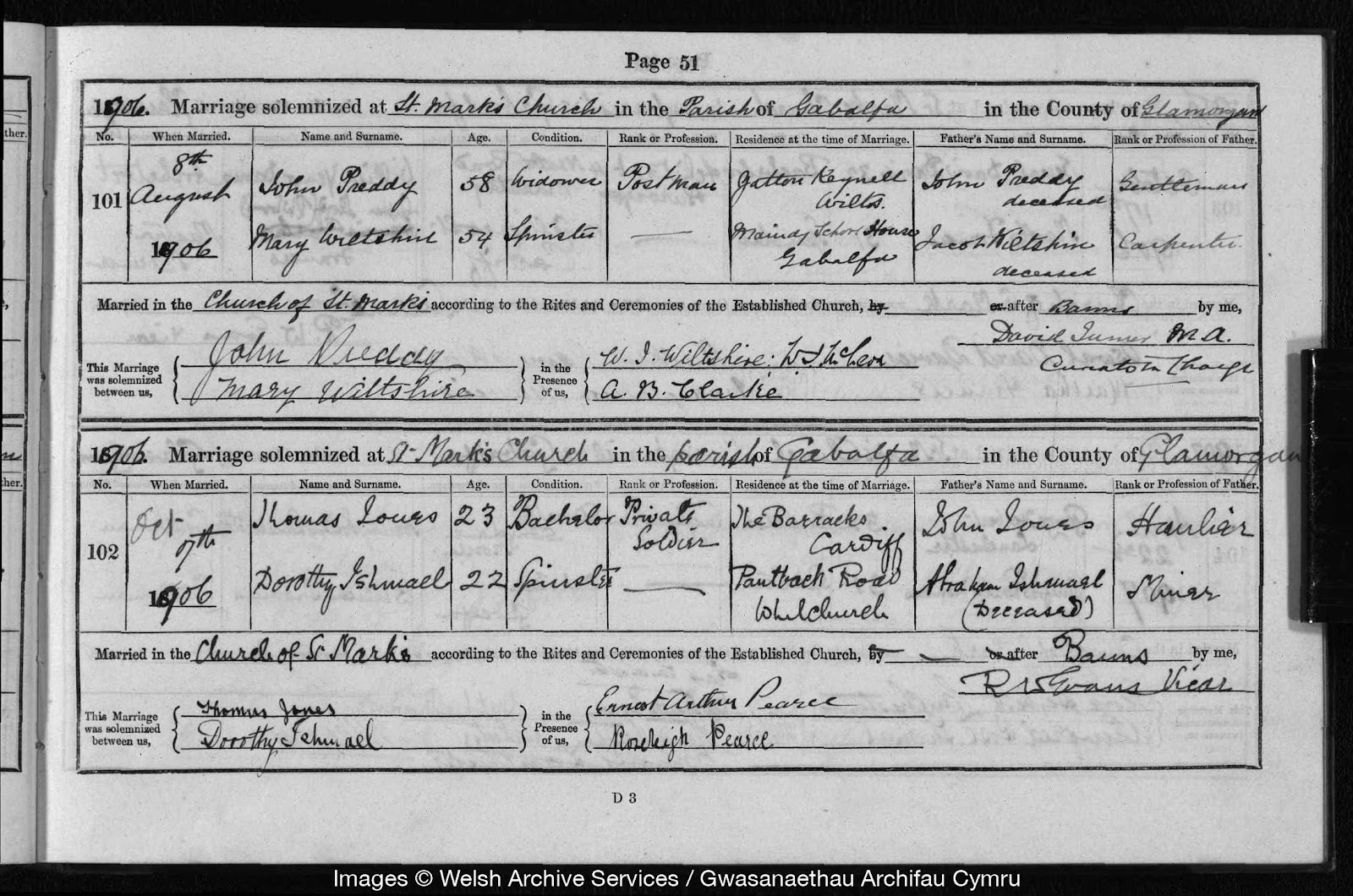
Example of 1906 Marriage Register from Gabalfa, Cardif, Glamorgan found online at TheGenealogist [1]
What if my ancestor was a nonconformist?
Not all ancestors will have worshiped regularly at the Anglican Parish Church for their area as nonconformist denominations were particularly strong in Wales. Nonconformist churches are those that do not conform to the doctrines of the Anglican church, that is they dissent from the once established Church of England in Wales and its successor the Church in Wales. Examples of Protestant nonconformist churches include the Baptist, Methodist, Presbyterian, and Unitarian denominations, and the Quakers (or the Society of Friends).
You can search for nonconformist ancestors in the records that were collected by the General Register Office in 1837, when civil registration began, and again in 1857. Many of these are now kept at The National Archives and are filed under catalogue series codes RG 4, RG 5, RG 6, and RG 8, all available to search on the official partner of TNA for these records.[2] Other registers could have been deposited at the National Library of Wales (Llyfrgell Genedlaethol Cymru) [3] or in County Record Offices. Sadly, however, many have simply not survived the years and are lost to us.
Birth and baptism registers make up the majority of records in these nonconformist collections. Though there are a number of burial registers also included amongst them, in RG 4, RG 6 and RG 8, The reason for this is that even if your ancestor was from one of the other denominations, before the 1850s, the vast majority of burials were in the churchyard of the local Parish Church and so they are recorded in the parish registers of the Church of England in Wales. Very few dissenters had their own burial grounds and so this explains the lack of burials in these series.
Another reason to search for your ancestor in the Anglican Parish Records is that there were only a small number of marriage registers amongst the nonconformist collections. The reason for this was that between 1754 and 1837 only Church of England marriages were considered legal by the state. An exception to this was that Quakers and Jews were exempt from this law and RG 6 contains exclusively Quaker records.
How to find your Welsh ancestors in the church records
As an example, we are going to search for the much admired Elizabeth 'Betsi' Cadwaladr who was famous for working as a nurse in the Crimean War alongside Florence Nightingale, but having her differences with the great nursing pioneer. Betsi was from a working class family who lived in the small village of Llanycil in Gwynedd, the county that was known as Merionethshire at the time.
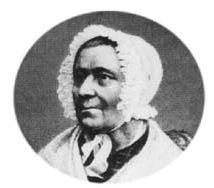
https://en.wikipedia.org/wiki/Betsi_Cadwaladr
We can search Welsh Parish Records for Elizabeth Cadwaladr using the information that is known about her. If you are looking for your own ancestor it is likely that you already have some details to go on. Perhaps you know the name of the village, town or city that they came from? Maybe you know their date of birth, having already found them in the census collection? Stories about their lives can often give the researcher a starting point, but it is important to realise that family tales can get exaggerated or embellished over time. They are best used as a basis for further research where you aim to prove or disprove them.
In Betsi’s case we know from stories about her that her birth had been around 1799 and that she called Llanycil, a village near Bala in Wales her home. For our search we are going to use the online Welsh Parish Records at TheGenealogist [1] rather than going physically to an archive.
Using the Master Search on this site we enter Elizabeth as a forename and Cadwaladr as the surname while ignoring her nickname, Betsi. In this case we know her birth was around 1799 and so we could choose a search two years either side of this date (We can adjust the leeway on this from the +/- dropdown on the Master Search). We could enter the place name, or any other details that will appear on the records such as the father’s and/or mother’s forename, into the Keywords box before hitting Search.

Use TheGenealogist [1] online Master Search to look for All records from Birth & Baptisms
This returns us a number of results and, by referring to her family story that she had been born in Llanycil in Merionethshire, we are able to see that one of the results we have is for a baptism in that particular community.
A click on the link icon to View the Original Image provides us with the register page on which we can see, written by hand in May 1789, Elizabeth of David Cadwaladr and Judeth his wife. There follows the number 26 for the 26th day of the month.
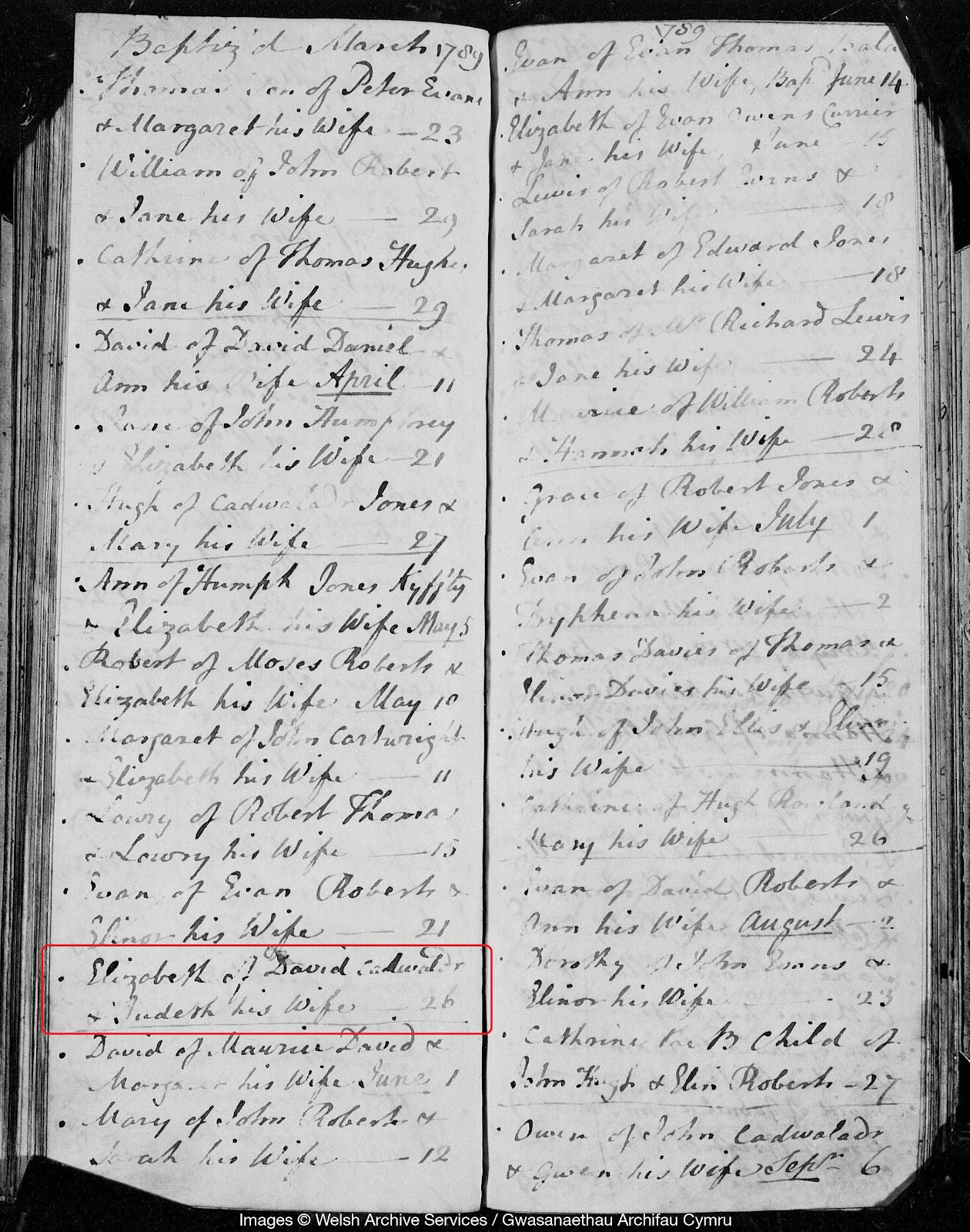
Image of the original page in the Parish Register of Llanycil 1789
Welsh or English spelling?
Betsi’s father was better known by the Welsh spelling of his name as Dafydd but here the vicar, or parish clerk, has used the anglicised version of his name. By the time of Betsi’s father’s death in 1834 the church registers were now kept in seperate printed books (first introduced by an Act of Parliament in 1812) where Baptisms, Marriages and Burials were in separate volumes, but Dafydd is still recorded as David.
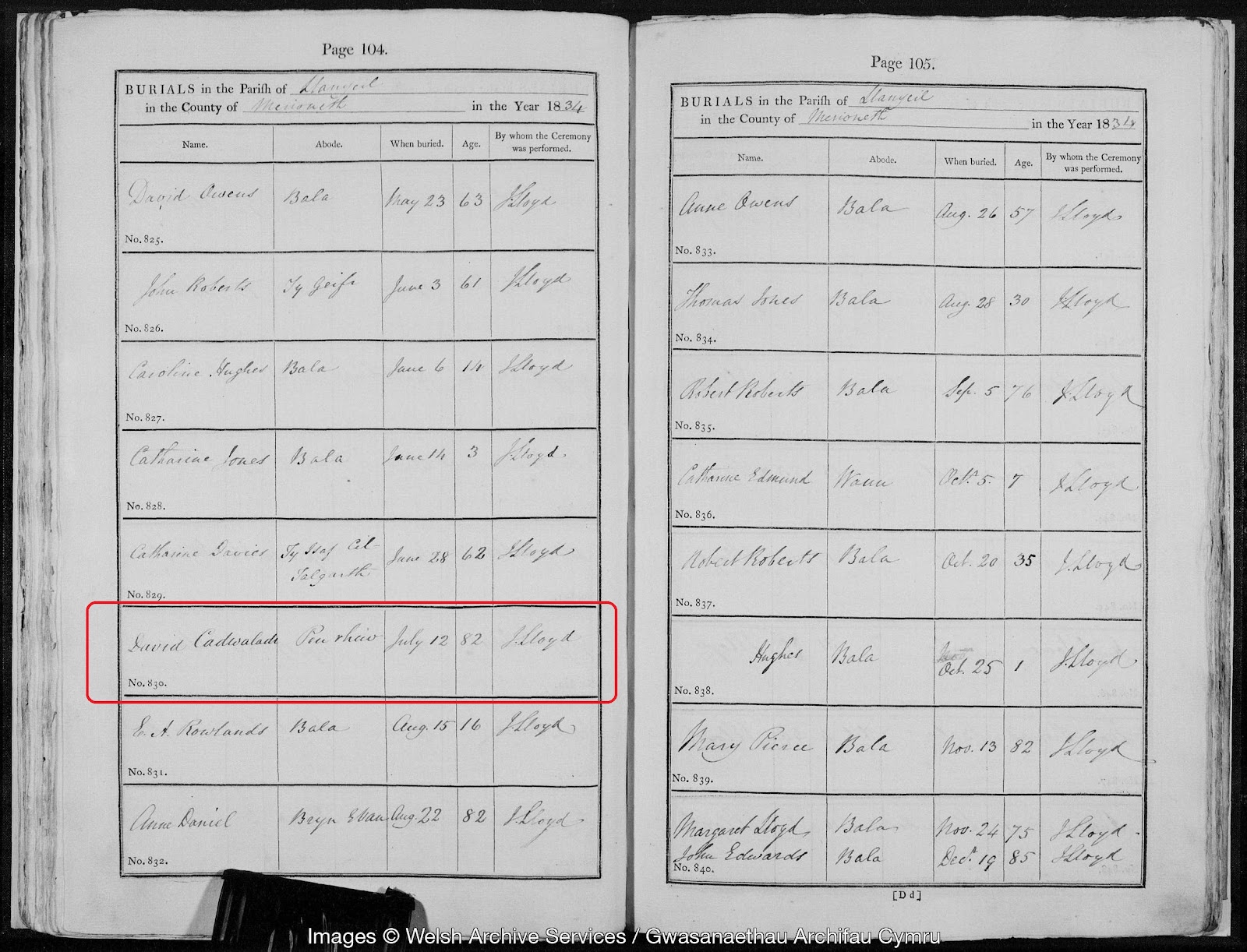
1834 Parish Register for Llanycil
My nonconformist ancestor is in the Anglican Parish Register!
These entries in the Anglican Parish Church Register highlight an interesting point that researchers should try to keep in mind. We have seen above that burials of nonconformist ancestors were common in Parish Churchyards, because the other denominations were less likely to have their own burial grounds near to their chapels. Everyone, however, had the right to be buried in the local parish Churchyard under the law, though it was only in 1880 that disenter ministers could carry out the burial service and so it would have been the Church of England vicar or curate who carried out most of our ancestors’ services.
For a period between 1754 and 1837 only Church of England marriages, or those of Quakers and Jews, were considered legal by the state and so we would expect to find our nonconformist ancestors also being married in the Anglican registers. But, as in the example of the Cadwaladr family, you may also find that they baptised their child in the Anglican church as well.
Now here is a surprise!
What is unusual about this story is that Betsi’s father, Dafydd Cadwaladr (1752–1834)[4] was actually a Welsh Calvinistic Methodist preacher! This is a great example of why you should still look in the Established Church records even when you know that your ancestors were nonconformists. Dafydd Cadwaladr had been a farm worker until about 1771 when he took up a position as a servant working for the Methodist preacher William Evans. Dafydd knew his bible by heart, and about 1780 he began preaching himself, but he was not a minister. The fact is that until 1811 the Calvinistic Methodists had no ministers ordained by themselves.
The Welsh Parish Records are unlikely to still be with the incumbent of the actual church and are deposited with the archives for that county. They are, however, now easily searchable online with images of the actual register pages. TheGenealogist.co.uk has worked with the input of Welsh records experts from all the Welsh archives, to painstakingly check and improve all the place names in this record set. Chapels of ease are recorded, as are the parent parishes of modern parishes and variant spellings in the English and Welsh languages are included in this collection online. This should mean that searches for your ancestor in the parish records, which previously might have turned up no results, will now have a much greater chance of being found. With TheGenealogist’s keyword search this has made it surprisingly easy to find the records that have been used in this article.
Links
[1] https://www.thegenealogist.co.uk/welsh-parish-records
[2] https://www.thegenealogist.co.uk/non-conformist-records/
[3] https://www.library.wales/
[4] https://en.wikipedia.org/wiki/Dafydd_Cadwaladr

